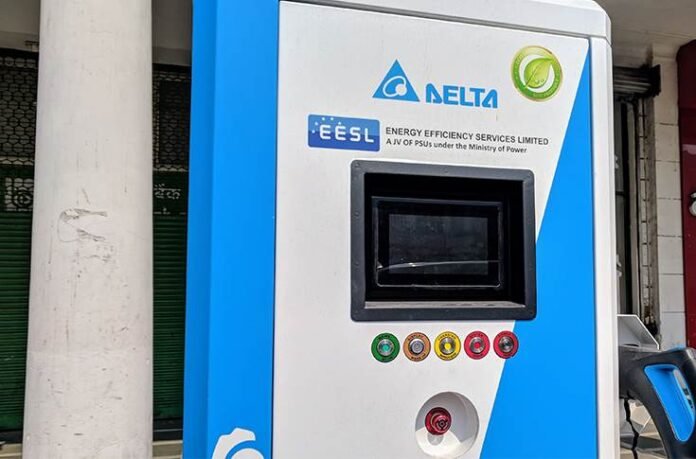Taiwan-headquartered Delta Electronics, which is a strong player in the areas of industrial automation, power electronics, data centres, as well as EV charging infrastructure in India, foresees strong growth potential in the EV charging domain, in line with the growing adoption of electric vehicles in the country.
Since 2017, Delta Electronics India has installed over 10,000 EV chargers – ranging from 3kW to 350kW charging capacity – that cater to several vehicle segments, including two- and three-wheeler, as well as passenger vehicle categories.
The company says it has invested heavily in the design, manufacturing, as well as sales operations for the EV industry in India, and envisages strong growth in the EV charging domain. “We envisage strong growth in this vertical, and given our global expertise and focus in the EV charging domain, we are a very capable player in this area. With our power electronics, thermal management, and software capabilities put together, we are a very strong contender in the EV charging infrastructure segment in India,” Rajesh Kaushal, Vice President, Delta Electronics India, told Autocar Professional.
While it offers both on-board and off-board chargers for the two- and three-wheeler segments, the company aims to now foray into high-voltage fast chargers for electric buses. The company has a strong focus on local manufacturing and development, and has invested US$ 500 million in the country so far, including in a new factory in Krishnagiri, Tamil Nadu. It manufactures EV chargers from its first plant in Rudrapur, Uttarakhand.
Delta Electronics India also plans to offer localised EV components, such as power electronics, from its global portfolio for automotive OEMs in India. Beyond EVs, the automotive industry forms a strong pillar of Delta Electronics India’s business, with the company’s industrial automation offerings, including IoT and Industry 4.0 solutions, being the key products for the sector.
Delta Electronics India, which was established in 2003, has scaled to a size of 3,500 people in its workforce, of which, around 500 people are engaged in R&D, engineering, and field application roles, across its Bengaluru and Gurugram R&D centres, with the latter focusing on EV charging product innovation, as well as development of low- and high-power power electronics products.
The company says it realises a sharp focus on R&D, and while globally, Delta Electronics invests around 8 percent of its annual revenues into R&D, in India, the number stands at around 6.5 percent of its annual turnover.
“Delta Electronics will continue to invest in India, and being a large country with a highly-skilled workforce, there is a significant focus on India. We have plans to invest in the area of R&D and grow our engineering strength to 2,000 people over the next few years,” said Kaushal.
“We support our global operations in the design and development activities of several projects. India is a centre of excellence from an R&D perspective, and software is one of the key capabilities that we have, and excel in. Delta has significant expansion plans, including making India its global hub for excellence for global operations,” he added.
From L-R: Rajesh Kaushal, VP, Delta Electronics India, Benjamin Lin, President, Delta Electronics India; Niranjan Nayak, MD, Delta Electronics India.
On January 18, Delta Electronics India showcased its unique mobile data centre in Gurugram, with an aim to offer quick installation and minimal downtime for its potential customers across the IT, enterprise, industrial, and transportation segments. The company says the prefabricated micro data centre will allow quicker and faster access to data for its customers as they increasingly look to reduce time to set up such a digital infrastructure for their business operations that are relying on immense amounts of data.
Globally, Delta Electronics clocked US$ 13 billion in revenues in CY23, and as per Kaushal, the electronics major continues to grow, both in India, as well as on the international turf.
“Industrial and automotive (including EVs) segments are very attractive areas for us, particularly in terms of the industrial automation services that we offer. Therefore, automotive remains a key segment for us. Moreover, there is significant opportunity in the EV segment going forward,” Kaushal said.
Post Disclaimer
The information provided in our posts or blogs are for educational and informative purposes only. We do not guarantee the accuracy, completeness or suitability of the information. We do not provide financial or investment advice. Readers should always seek professional advice before making any financial or investment decisions based on the information provided in our content. We will not be held responsible for any losses, damages or consequences that may arise from relying on the information provided in our content.



